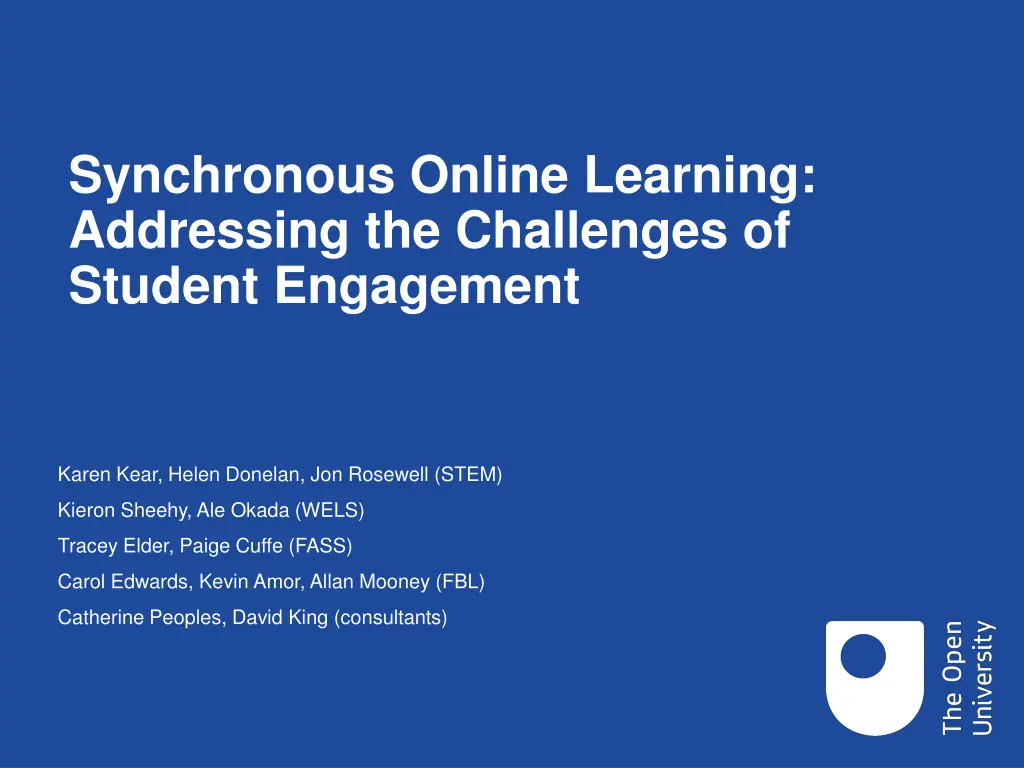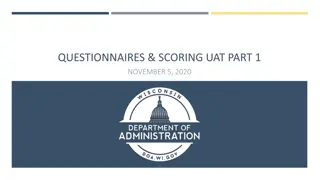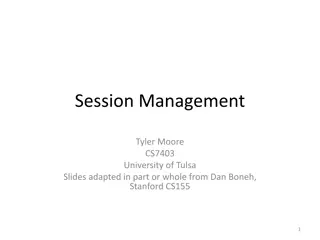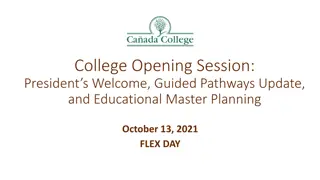
Addressing Student Engagement Challenges in Synchronous Online Learning
Explore the research project on addressing student engagement challenges in synchronous online learning, investigating factors affecting engagement and proposing solutions. Survey findings reveal student and lecturer perspectives on tutorial activities and preferences.
Download Presentation

Please find below an Image/Link to download the presentation.
The content on the website is provided AS IS for your information and personal use only. It may not be sold, licensed, or shared on other websites without obtaining consent from the author. If you encounter any issues during the download, it is possible that the publisher has removed the file from their server.
You are allowed to download the files provided on this website for personal or commercial use, subject to the condition that they are used lawfully. All files are the property of their respective owners.
The content on the website is provided AS IS for your information and personal use only. It may not be sold, licensed, or shared on other websites without obtaining consent from the author.
E N D
Presentation Transcript
Synchronous Online Learning: Addressing the Challenges of Student Engagement Karen Kear, Helen Donelan, Jon Rosewell (STEM) Kieron Sheehy, Ale Okada (WELS) Tracey Elder, Paige Cuffe (FASS) Carol Edwards, Kevin Amor, Allan Mooney (FBL) Catherine Peoples, David King (consultants)
THE PROJECT Online synchronous tutorials are an important part of the OU s tuition strategy. They have been vital in replacing face-to-face tutorials during the pandemic. However, there is often a lack of active participation by students. Our project, sponsored by the pan-university scholarship fund, investigates this issue. Research questions: 1. To what extent do the challenges of student engagement vary across faculties? 2. What are the factors affecting student engagement in online tutorials? 3. How can these challenges be addressed? 2
RESEARCH METHODS Two large-scale surveys Students and Associate Lecturers 18 Level 2 modules covering all faculties Quantitative and qualitative data Similar questions in both surveys Enable comparison of student and AL perspectives Survey questions about topics such as What sort of activities are offered? Do students actively participate? If they don t, why is this? Next stage Focus groups of students and ALs from each faculty Analyse the quantitative data by faculty and module Analyses the qualitative data 3
SURVEY FINDINGS Student survey 620 students responded (8% response rate) Numbers of respondents varied by module (from 10 to 82) 86% of respondents had attended at least one online tutorial 88% took part in tutorial activities (a lot or a little) 50% looked forward to a tutorial, but 10% felt anxious beforehand Associate Lecturer survey 197 ALs responded (22% response rate) Numbers of respondents varied by module (from 3 to 27) Most were very experienced in running online tutorials 42% preferred face-to-face tutorials; 25% preferred online A third run online tutorials with another AL; a third on their own. Most design their own tutorial resources; others adapt resources from other ALs or the module team 4
Activities included in tutorials 0% 5% 10% 15% 20% 25% Answering questions Asking questions Taking part in a poll or quiz Discussions in the main room Discussions in break out rooms Solving problems Practising skills Contributing on the whiteboard Students Tutors Other 5
Students enjoy online tutorials where they can actively take part 0% 5% 10% 15% 20% 25% 30% 35% 40% 45% 50% Strongly agree Agree Neither agree nor disagree Disagree Strongly disagree Students Tutors 6
Students benefit if they actively take part in online tutorials 0% 10% 20% 30% 40% 50% 60% Strongly agree Agree Neither agree nor disagree Disagree Strongly disagree Students Tutors 7
Reasons for not participating actively 0% 5% 10% 15% 20% 25% Happy to just listen Pace too fast Technical problems Too nervous Do not have a microphone Do not have a webcam Worried what tutor might think Worried what other students might think Not sure how to use Adobe Connect Have nothing to contribute Not confident about their knowledge Behind in module studies Home/surrounding envt. not suitable Too many students in the group Too few students in the group Tutorial being recorded Students Tutors Other 8
Students feel stressed in online tutorials when they are expected to actively take part 0% 5% 10% 15% 20% 25% 30% 35% 40% 45% Strongly agree Agree Neither agree nor disagree Disagree Strongly disagree Students Tutors 9
Students prefer to use the text chat rather than speak in online tutorials 0% 10% 20% 30% 40% 50% 60% 70% Strongly agree Agree Neither agree nor disagree Disagree Strongly disagree Students Tutors 10
Students feel confident speaking in online tutorials 0% 10% 20% 30% 40% 50% 60% Strongly agree Agree Neither agree nor disagree Disagree Strongly disagree Students Tutors 11
Students feel comfortable using a webcam in an online tutorial 0% 5% 10% 15% 20% 25% 30% 35% 40% Strongly agree Agree Neither agree nor disagree Disagree Strongly disagree Students Tutors 12
INTERPRETING THE DATA Student participation in activities Students enjoy participating and think it is beneficial But some find it stressful Reasons for not participating Students are happy to listen, or feel they have nothing to contribute They are not confident in their knowledge or are behind in the module They are nervous, or worry about what other students or the tutor(s) might think of them Comparing students and tutors perspectives Tutors viewed active participation as more beneficial than students did Students reported more willingness to speak and use a webcam than tutors expect Explanations for these differences? Are the students who responded to the survey more confident than most? Are tutors assuming lower confidence based on student behaviour? What do YOU think? 13
THANK YOU Karen.Kear@open.ac.uk






















